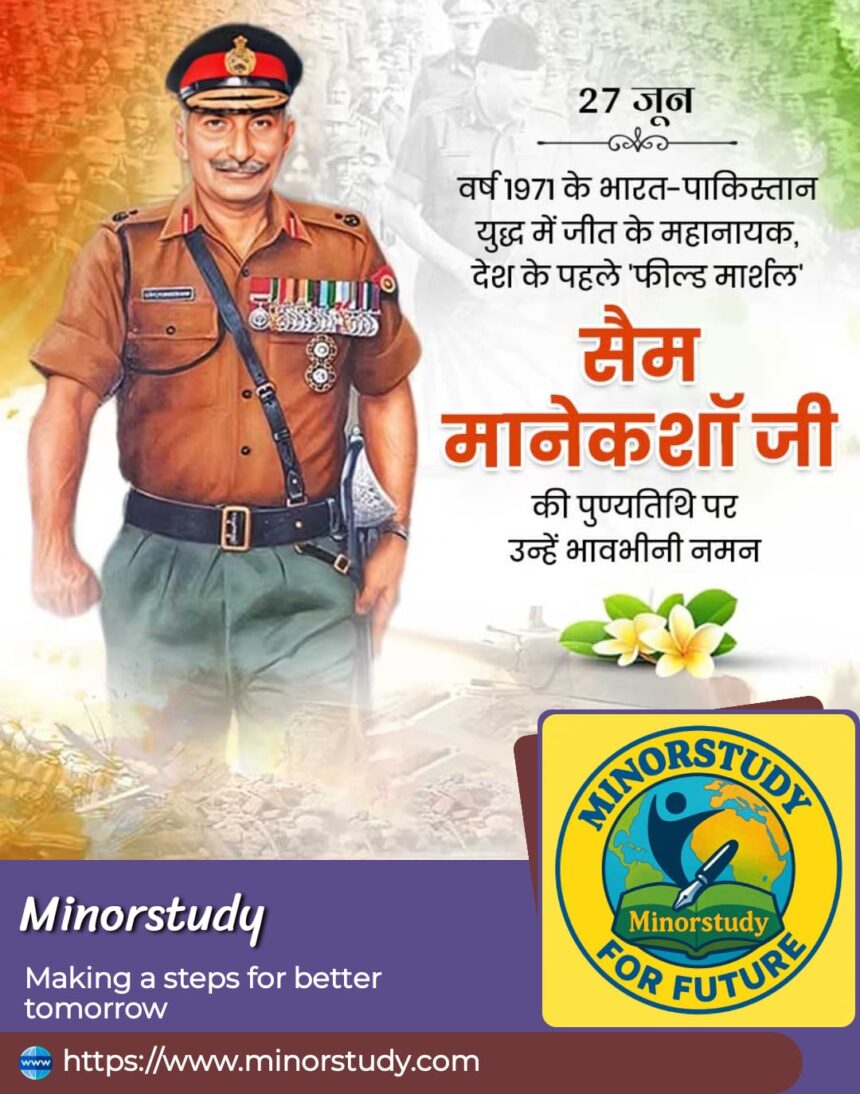7 Unforgettable Lessons from the Legendary Life of Field Marshal Sam Manekshaw – A True War Hero
Introduction: Field Marshal Sam Manekshaw
Field Marshal Sam Manekshaw: Few figures in Indian military history command as much admiration and respect as Field Marshal Sam Hormusji Framji Jamshedji Manekshaw, affectionately called Sam Bahadur. His life wasn’t just about battlefield strategies but about unwavering courage, charismatic leadership, and a delightful blend of wit and wisdom. As India’s first Field Marshal and a national icon during the 1971 Indo-Pak war, his influence resonates far beyond the borders of military life.
- Introduction: Field Marshal Sam Manekshaw
- History: The Making of Field Marshal Sam Manekshaw
- Key Facts You Should Know
- Timeline of Major Life Events
- Significance in Indian and World History
- Observance and Legacy
- Wishing and Remembering Sam Bahadur
- Important Points to Remember
- Impact on Our Lives Today
- 1. Inspired Generations of Soldiers
- 2. Civilian Role Model
- 3. Influence on Defence Policies
- 4. Education and Leadership
- 5. Pop Culture Legacy
- Conclusion: A Hero for the Ages
- FAQs About Field Marshal Sam Manekshaw
- Q1: Why is Sam Manekshaw called “Sam Bahadur”?
- Q2: How did he win the 1971 Indo-Pak War?
- Q3: Did he ever enter politics after retirement?
- Q4: Was Sam Manekshaw ever criticised?
- Q5: Are there memorials dedicated to him?
- Final Salute 🫡
Let’s delve into the remarkable history, legacy, key facts, timeline, significance, and impact of this legendary warrior whose service to the nation remains immortal.
History: The Making of Field Marshal Sam Manekshaw
Born: 3 April 1914, Amritsar, Punjab
Died: 27 June 2008, Wellington, Tamil Nadu
Ethnicity: Parsi
Military Rank: Field Marshal (India’s first)
Service Years: 1934 – 1973
Sam Manekshaw was born in a Parsi family, the son of a doctor who initially wanted him to follow in his footsteps. However, Sam had different ambitions. In 1932, when the Indian Military Academy (IMA) opened in Dehradun, he became one of the first cadets in its inaugural batch — later called the “First Course” or “Pioneers.”
He was commissioned into the British Indian Army in 1934, serving in Burma during World War II, where he was badly wounded but survived miraculously. That moment, where he insisted on being recognized as injured before collapsing, became emblematic of his fearless and humorous spirit.
Key Facts You Should Know
Survived WWII Injury: Shot in the stomach by a Japanese machine gun, he was presumed dead but miraculously recovered.
First Field Marshal of India: Honoured with this rank in 1973 by President V. V. Giri.
Led India to Victory in 1971 War: Played a crucial role in the creation of Bangladesh.
Known for Wit and Charm: Famous for sharp, humorous one-liners even in critical situations.
Never Played Politics: He avoided political ambitions despite being respected by politicians across parties.
Served Under Five Prime Ministers: Including Nehru, Shastri, Indira Gandhi, Morarji Desai, and Rajiv Gandhi.
Highest Military Decorated Officer: Besides Field Marshal rank, he was awarded Padma Vibhushan and Padma Bhushan.
Timeline of Major Life Events
| Year | Event |
|---|---|
| 1914 | Born in Amritsar |
| 1932 | Joined Indian Military Academy |
| 1934 | Commissioned into British Indian Army |
| 1942 | Wounded in WWII during Burma campaign |
| 1947 | Served during partition and Kashmir conflict |
| 1962 | Played advisory role during Indo-China war |
| 1965 | Chief of General Staff during Indo-Pak war |
| 1969 | Appointed Chief of Army Staff |
| 1971 | Led India to victory over Pakistan; Bangladesh was born |
| 1973 | Promoted to Field Marshal |
| 2008 | Passed away in Wellington, Tamil Nadu |
Significance in Indian and World History
Military Genius
Manekshaw had a strategic brain and an intuitive understanding of enemy psychology. He gave India not just a decisive victory in 1971, but ensured minimum casualties and maximum morale.
Builder of Modern Indian Army
He shaped the Indian Army’s post-colonial ethos — disciplined, secular, and people-oriented. He upheld integrity and institutional values over personal ambition.
Architect of Civil-Military Relations
He famously said, “I wonder whether those of our political masters who have been put in charge of the defence forces can distinguish a gun butt from a bullet.” This was a subtle yet firm reminder of military professionalism and the need for informed political leadership.
Observance and Legacy
Though Sam Manekshaw’s birth and death anniversaries are not national holidays, they are solemnly observed in military circles and by defence institutions like the National Defence Academy and Indian Military Academy.
His bungalow in Wellington, Nilgiris, where he lived and passed away, has become a pilgrimage site for young officers and veterans alike.
Wishing and Remembering Sam Bahadur
On his death anniversary (27 June) and birth anniversary (3 April), tributes flood in from across the armed forces and civil society:
🕊️ “Salute to Sam Bahadur, the lion of India whose roar still echoes in the borders of our freedom.”
🇮🇳 “Your bravery gave us Bangladesh, your humour gave us hope. India remembers you with pride, Field Marshal Sam Manekshaw.”
Important Points to Remember
He refused to rush into war in 1971 until Indian forces were fully prepared. This calculated delay helped ensure a swift and decisive victory.
He never compromised military autonomy, even when pressured by political leaders.
His speeches and interactions with soldiers always ended with inspiration, humour, and pride.
He believed in the secular fabric of the armed forces, respecting all faiths and communities.
Post-retirement, he lived simply, staying away from the limelight, yet was always regarded with reverence.
Impact on Our Lives Today
1. Inspired Generations of Soldiers
Young officers continue to look up to him as the ideal military leader — decisive, brave, ethical, and witty.
2. Civilian Role Model
He wasn’t just a general; he was a nation builder who reminded India of courage, discipline, and honour — qualities much needed in civil society today.
3. Influence on Defence Policies
His principles still influence India’s military doctrine and civil-military policies. Defence planning, preparedness, and strategic patience owe a lot to his legacy.
4. Education and Leadership
Many institutions conduct leadership case studies based on his war strategies and decision-making skills.
5. Pop Culture Legacy
His persona inspired documentaries, books, and planned biopics — ensuring his story reaches the younger, tech-savvy generation.
Conclusion: A Hero for the Ages
Field Marshal Sam Manekshaw was not just a military man, but a moral compass and a national symbol of resilience and integrity. He faced wars, political pressure, and near-death situations — but emerged every time with courage in his chest and a smile on his face.
In a world often lost in noise, Sam Bahadur reminds us of the value of doing what is right, speaking the truth boldly, and serving with selflessness.
💡 His message?
“You can’t do everything, but you can do your duty well. And that makes all the difference.”
FAQs About Field Marshal Sam Manekshaw
Q1: Why is Sam Manekshaw called “Sam Bahadur”?
A: Soldiers affectionately gave him the name “Sam Bahadur” (Sam the Brave) during a visit to Gorkha troops — a mark of deep respect and admiration.
Q2: How did he win the 1971 Indo-Pak War?
A: Through brilliant strategy, preparation, and timing. He waited for the right moment, built alliances (notably with the USSR), and ensured India’s forces were well-prepared.
Q3: Did he ever enter politics after retirement?
A: No, he remained apolitical and never accepted any political post or party affiliation.
Q4: Was Sam Manekshaw ever criticised?
A: Some political circles found his frankness inconvenient, but he was widely respected for his integrity and service.
Q5: Are there memorials dedicated to him?
A: His grave in Wellington, Tamil Nadu, is maintained with honour. Defence academies conduct events in his memory.
Final Salute 🫡
Field Marshal Sam Manekshaw was more than just a military figure — he was a beacon of hope, wisdom, and national pride. He taught us that courage is not the absence of fear, but the triumph over it, and that humour can be a weapon as powerful as a gun.
So let us remember him not just on anniversaries, but every time we talk about leadership with a human heart.









I’m gone to inform my little brother, that he should also paay a visit this weblog on regular basis to
get updated from most recent news update.